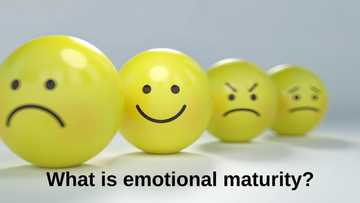When Love Hurts: Is It Just a Rough Patch or a Red Flag of Emotional Abuse?
Editor's note: In this piece, Duke Ezikpe Mma draws insight from actress Chacha Eke’s recent revelation about her troubled marriage to explore the line between normal relationship stress and emotional abuse, urging readers to spot red flags hidden in plain sight.
We all encounter stress in varying degrees. At its lowest levels, we often bounce back to our normal state without even realising we've experienced it.
Normal stress in a relationship comes as everyday pressures, strains, and demands that are a natural part of life, whether a shared life as in a marital setting or we lead a single life or any relationship dynamics relevant in our modern society. These normal stresses are not particularly negative in themselves, but they can become challenging if not managed effectively. For instance, a student in secondary school is expected to do an assignment as of when due (the assignment is a normal stress for a student), if the student refuses to do the assignment or neglects to do the assignment, this normal stress can become a challenge leading to distress.

Source: Getty Images
So also in marital settings, there is a wide range of stress that can be considered normal stress for instance, stress involving finance can spring up disagreements which often involve spending habits, managing debt, or simply the pressure of making ends meet.
Secondly, household responsibilities can also cause normal stress like, who does the dishes, laundry, childcare, goes to market, etc. If one partner feels they are carrying a disproportionate share of the load, it can lead to resentment and conflict. For instance, if one spouse constantly feels overwhelmed by household chores while the other doesn't contribute equally, this creates ongoing stress.
Thirdly, misunderstandings as a result of communication which can be caused through differing communication styles, and the effort required to truly listen and understand each other are normal stresses. For example, one partner might be more direct in their communication, while the other is more indirect, leading to misinterpretations or simply finding the time and energy to have meaningful conversations amidst busy schedules can be a challenge.
Furthermore, differing needs and expectations are considered normal stress as couples within a marital setting will naturally have different needs for things like alone time, social interaction, intimacy, and personal pursuits. Balancing these differing needs and expectations requires compromise and communication, which can be a source of normal stress. For instance, one partner might be more introverted and need more quiet time, while the other is more extroverted and thrives on social interaction. Finding a balance that satisfies both can be a continuous negotiation. Sequel to expectation can be life outside the marriage which can inevitably impact the relationship. Work stress, family issues, health concerns, and social obligations can all bring normal stress into the marital dynamic. For example, a demanding job with long hours can leave one partner feeling emotionally and physically drained, impacting their ability to engage fully in the relationship.
Finally, boundaries and feelings are normal stresses in marital settings, in this instance, when couples do not respect each other’s boundaries and feelings. Though two have become one, in the relationship, there is a need for both to respect each other’s privacy and boundaries. When one partner consistently breaks the other boundary, it can lead to an altercation which will lead to distress in the relationship.

Source: Instagram
In the story that Chacha Eke shared on her Instagram handle, you can see some indicators of emotional stress such as love without respect, struggles, heartbreaks, disappointments, a struggle with family responsibilities, the death of both of her parents suddenly and the death of her child. When you point all of this together, you will see why she was not emotionally stable. And people that are not emotionally stable can be triggered by just anything, things that normally they can handle without being dramatic about it.
What is psychological/emotional abuse? According to the Diagnostic and Statistical Manual of Mental Disorders, Fifth Edition (DSM-5), psychological abuse is defined as verbal or symbolic acts given by a parent or caregiver that can result in significant psychological harm. It could also be seen as a relationship that is characterized by patterns of harmful interactions. According to the United Nations on domestic abuse, emotional abuse includes undermining a person's sense of self-worth through constant criticism; belittling one's abilities; name-calling or other verbal abuse; damaging a partner's relationship with the children; or not letting a partner see friends and family.
Abuse is any and every action that has the intention to exert control or hurt another human being. When abuse happens, it is always about establishing and demonstrating power and control over someone. People in emotionally abusive relationships will always pass through what is known as, the “cycle of abuse”. The cycle includes tension, incident, reconciliation and calm and the cycle will continue again.

Source: Getty Images
The most prevalent of the emotional abuse are manipulation and gas-lighting. Gas-lighting gets its name from the 1944 film "Gaslight," in which a husband tries to drive his wife insane by manipulating her perception of reality. The term has since been used to describe a specific type of psychological abuse where a person is made to doubt their own experiences, memories, and perceptions. Gas-lighting can take many forms, including denial of previous agreements or conversations, blaming the victim for the abuser's behavior, and minimizing or trivializing the victim's feelings or experiences. Some of the signs include a key tactic, involving denying reality, erasing history, and omitting information to distort the victim's perceptions. Other manipulative behaviors include blame-shifting, minimizing the impact of abuse, emotional manipulation through guilt or anger, projection of one's faults, and denying prior agreements, all contributing to the victim's self-doubt and dependence on the abuser's distorted reality. These tactics erode trust and create instability, making the victim question their memory, judgment, and emotional experiences, ultimately aiming to control and dominate them.
In conclusion, while normal relationship stress, stemming from everyday pressures like financial disagreements, household responsibilities, communication differences, differing needs, external life events, and boundary issues, is a natural part of shared lives and can be managed through effective communication, emotional abuse is distinct. Emotional abuse, as defined by the DSM-5 and the United Nations, involves patterns of harmful interactions aimed at exerting control and undermining a person's self-worth through tactics like constant criticism, belittling, name-calling, manipulation, and gas-lighting. Unlike normal stress, which can become challenging if unmanaged, emotional abuse is inherently damaging to mental health, often trapping victims in a cycle of abuse and eroding their sense of reality and self. Recognizing the difference between these experiences is crucial for fostering healthy relationships and addressing the detrimental impact of emotional abuse.
Disclaimer: The views and opinions expressed here are those of the author and do not necessarily reflect the official policy or position of Legit.ng.
Duke Ezikpe Mma of Nextdoor_Therapy is a Mental Health Specialist, Educationist, Coach, and Writer dedicated to mental wellness and advocacy.
PAY ATTENTION: Сheck out news that is picked exactly for YOU ➡️ find the “Recommended for you” block on the home page and enjoy!
Source: Legit.ng

Ololade Olatimehin (Editorial Assistant) Olatimehin Ololade is a seasoned communications expert with over 7 years of experience, skilled in content creation, team leadership, and strategic communications, with a proven track record of success in driving engagement and growth. Spearheaded editorial operations, earning two promotions within 2 years (Giantability Media Network). Currently an Editorial Assistant at Legit.ng, covering experts' exclusive comments. Contact me at Olatimehin.ololade@corp.legit.ng or +234 802 533 3205.

Duke Ezikpe Mma (Mental Health Expert) Duke Ezikpe Mma is a Mental Health Specialist, Educationist, Coach, and Writer dedicated to mental wellness and advocacy. He holds degrees in Clinical Psychology from Nasarawa State University and Information Management from Ahmadu Bello University. As the founder of Where Do Broken Hearts Go and Grayscale Support Group, he provides safe spaces for individuals facing mental health challenges. A member of COSROPIN, he actively advocates for the well-being and rights of older persons in Nigeria.







